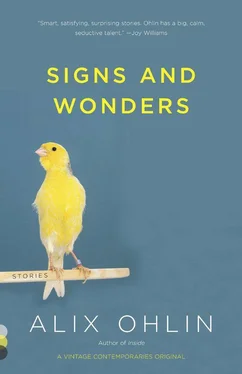Alix Ohlin - Signs and Wonders
Здесь есть возможность читать онлайн «Alix Ohlin - Signs and Wonders» весь текст электронной книги совершенно бесплатно (целиком полную версию без сокращений). В некоторых случаях можно слушать аудио, скачать через торрент в формате fb2 и присутствует краткое содержание. Год выпуска: 2012, ISBN: 2012, Издательство: Random House, Inc., Жанр: Современная проза, на английском языке. Описание произведения, (предисловие) а так же отзывы посетителей доступны на портале библиотеки ЛибКат.
- Название:Signs and Wonders
- Автор:
- Издательство:Random House, Inc.
- Жанр:
- Год:2012
- ISBN:9780307948649
- Рейтинг книги:3 / 5. Голосов: 1
-
Избранное:Добавить в избранное
- Отзывы:
-
Ваша оценка:
- 60
- 1
- 2
- 3
- 4
- 5
Signs and Wonders: краткое содержание, описание и аннотация
Предлагаем к чтению аннотацию, описание, краткое содержание или предисловие (зависит от того, что написал сам автор книги «Signs and Wonders»). Если вы не нашли необходимую информацию о книге — напишите в комментариях, мы постараемся отыскать её.
Signs and Wonders — читать онлайн бесплатно полную книгу (весь текст) целиком
Ниже представлен текст книги, разбитый по страницам. Система сохранения места последней прочитанной страницы, позволяет с удобством читать онлайн бесплатно книгу «Signs and Wonders», без необходимости каждый раз заново искать на чём Вы остановились. Поставьте закладку, и сможете в любой момент перейти на страницу, на которой закончили чтение.
Интервал:
Закладка:
“And he’s got his future all mapped out already. I mean, NYU,” the woman said. “My son wants to be a nightclub promoter. This is a profession? I think he saw it on TV or something. Pathetic.”
“Right,” Art said, and quickly went upstairs. Bruno was lying on the couch in the living room, listening to his iPod with his eyes closed.
Art shook his foot. “Hey,” he said. With the boy’s guileless face in front of him, Art didn’t know where to start. He wasn’t great at confrontation. The cruelest thing his ex-wife had ever said to him, right after the divorce was final, was, “You never even cared enough to fight.” He couldn’t believe she thought their marriage had failed because they got along too well. Of all the things a man could do wrong, this had been his error? Refusing to be a dick?
Bruno lit a cigarette.
“Are you having a good summer?” Art asked him.
“It’s not bad.”
“Are you lonely, being away from your friends? Your mom?”
“I don’t have many friends. My mother — eh, you know her.”
Art wasn’t sure what this meant. “Are you looking forward to going back, though? At the end of the month?”
Something like resignation dawned in Bruno’s eyes. He swung his feet down to the ground and rubbed his forehead with one hand, the cigarette still blazing in the other. He seemed weary beyond his years. “I’ve been meaning to talk with you about that,” he said.
“Okay,” Art said. “Talk.”
“I think school in Paris is stupid,” Bruno said, then launched into an explanation in French that Art had trouble following: something about there being channels, or tunnels, that students were slotted into and couldn’t escape from. He’d had fifteen years to improve his French and never gotten around to it; until now it hadn’t seemed like a big deal.
“Anyway,” Bruno continued, “so I thought, maybe I come here and study in America. I stay with you for a time, then I go to university here as resident. For you know, for cheaper.”
“For a time?”
“Sure,” Bruno said. “For high school.”
After that he stopped talking. Art knew this must have been a plan Bruno and Inès had cooked up together. It bore her stamp, which read, Ask forgiveness, not permission. Art glanced around the apartment. It had been two years since he’d had a woman here, Vivian from the magazine, who wanted him to pull her hair during sex and whom he’d never called again. Later he heard she’d moved to Colorado and become a Pilates instructor. In other words, he could hardly worry about Bruno cramping his style, when there was so little of it to cramp. But still.
“What is it that you want to study, anyway?”
“International relations,” Bruno said.
“Why do you have to do that here?”
“Because here,” Bruno said, “is where you need the most help. You need to be educated. To learn that America is not the center of the world.”
Art’s annoyance quickened his pulse. “I’m pretty sure you go to school to be educated, not tell other people what they don’t know.”
“Yes, of course,” Bruno said. “But Americans really need help. They are messing up the whole world with their terrible foreign policies. Maybe I can work with them, to change minds.”
It was in fact Art’s own opinion that America was messing up the whole world with its terrible foreign policies. But hearing it articulated so airily by a Parisian teenager made him defensive. Plus, the idea of Inès and Bruno conspiring together pissed him off.
“The world sits back and forces us to take command,” he said, “because nobody else is doing anything.”
“Nobody is forcing America to do anything. In France we opposed the Iraq war.”
“Yeah, you guys are perfect,” Art said. “I’m sure the Algerians agree.”
Bruno’s thin, pointy face reddened. “You know nothing about France.”
“And you’re not an expert on world affairs either, you little punk.”
Bruno spread his hands wide. “That’s why I go to school here, to become expert!” he said triumphantly. He grinned as if his case had been won, and with it the battle to stay. Art felt not anger but a sudden torque in his chest that he barely recognized, it had been so long, as excitement.
The dynamic between them shifted, or rather lurched, in a new direction. The relaxing days gave way to activity. Bruno was his charge, and there were things to do. They had to deal with the paperwork, get him registered at school, buy supplies, procure a medical checkup. Art started to give him a hard time about the smoking, too. Before, they’d been acting almost like roommates but now Art flexed the muscles of authority, and he was surprised how easily the benevolent dictatorship of parenthood came to him; he should have been doing this all along. Bruno, on the other hand, was not pleased. “What happened to you?” he grumbled. “You used to be calm. Now you are like, I don’t know. No fun.”
“That’s right,” Art said. “America is no fun. ”
He cleaned out the office, having determined that if Bruno was going to stay on, he’d need a real bedroom. The boy had been using his laptop occasionally and Art gave it to him permanently, setting him up at the desk. He brought Bruno to work one day, enjoying the looks of surprise on his coworkers’ faces when he introduced them to his son.
“I didn’t know you had a son,” said Samantha, the receptionist.
“I do now,” Art said, not stopping to answer when Samantha said, curiously, “ Now? ”
Within two weeks it was all settled: Bruno’s curfew, his route to school, his summer reading assignment of The House on Mango Street. As Art became more parental, the boy predictably rebelled. He stopped making eggs and doing the dishes. He spent his evenings on the stoop, muttering to himself and blowing smoke in the beagle’s face. And the notebook’s word pairs grew ominous:
Merciless hot
Satan machine
Glad down
One morning, late for work, Art grabbed his favorite cup out of the cupboard, poured himself some coffee, and choked at the first sip. There was a cigarette butt in it. Bruno was still asleep, or pretending to be, but Art imagined him laughing. When he got to the office, he e-mailed Inès and updated her on the situation. Her reply came almost instantly. He often behaves this way. Send him back if you want, she wrote languidly. You don’t have to keep him.
“Of course I don’t have to keep him,” Art said out loud. Samantha heard him — the company had an open-plan floor space — and cocked an eyebrow. He shook his head at her and typed back, Never mind. He knew Inès didn’t count on him to fix her son, or, for that matter, anything at all. Neither did Bruno. If Art said no to the high school plan, Bruno would shrug and get on the plane back to Paris. Art glanced around the office, filled with shiny, twentysomething heads. Nobody expected to stay here long, and everybody openly surfed for other jobs. The horizon of expectations was low. If he left today, he’d be replaced tomorrow. Drilling his fingers against his desk, Art thought, Enough.
When he got back to the apartment, Bruno wasn’t home. It was a suffocating summer night and the AC units labored mightily in the windows. Art stood in front of one, lifting his shirt to expose his stomach to the cool air. Above the machine’s huffing wind he could hear the familiar sounds of his block: traffic, construction, the beagle’s harassing wail.
He wandered into Bruno’s room, his old office now a scattershot landscape of flung T-shirts and discarded jeans. The boy’s suitcase lay open on the floor, its mouth disgorging even more clothes. The air smelled of teenage funk and dirty laundry. Art sat down at his desk. During the months of chemo, he’d spent most of his time on the futon in here, daydreaming of spectacular lives he might one day lead: he’d write a book about his ordeal; get back into political journalism; ask out Samantha, who always flirted with him even though she was so young; and soon he’d be on talk shows and in the New York Times. He’d lie on his back, cupping his groin as if he could heal it with the palm of his hand. It had been curiously peaceful, all standard concerns suspended in a liquid solution of ifs: if I get better, if I get through this … Strangely, when it all ended and he got his health back, the daydreaming and ifs evaporated. He was better but somehow lesser. He stopped imagining anything other than the life he had.
Читать дальшеИнтервал:
Закладка:
Похожие книги на «Signs and Wonders»
Представляем Вашему вниманию похожие книги на «Signs and Wonders» списком для выбора. Мы отобрали схожую по названию и смыслу литературу в надежде предоставить читателям больше вариантов отыскать новые, интересные, ещё непрочитанные произведения.
Обсуждение, отзывы о книге «Signs and Wonders» и просто собственные мнения читателей. Оставьте ваши комментарии, напишите, что Вы думаете о произведении, его смысле или главных героях. Укажите что конкретно понравилось, а что нет, и почему Вы так считаете.












